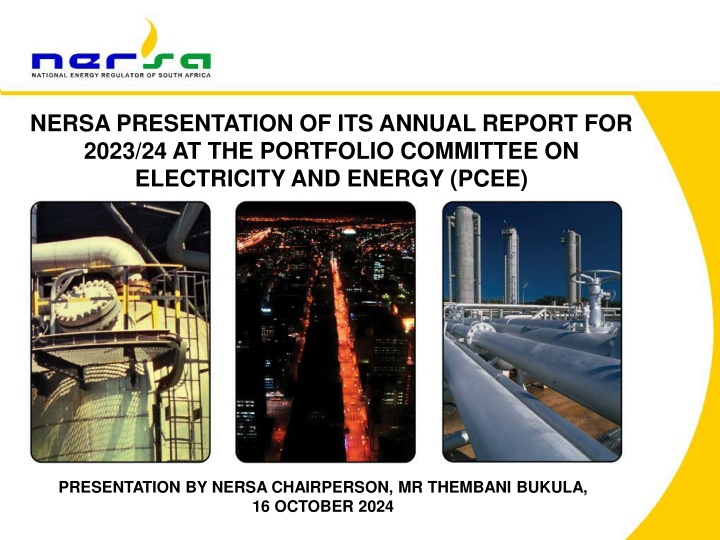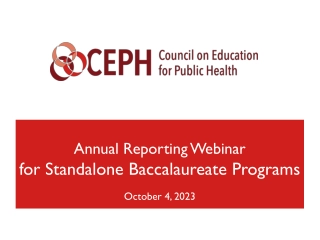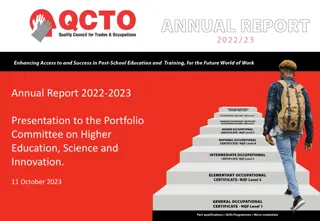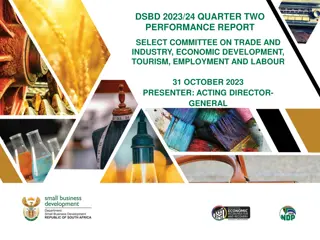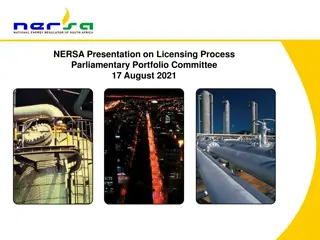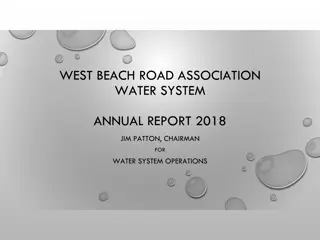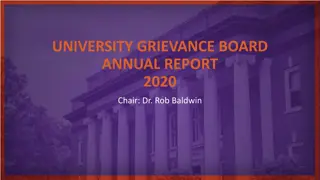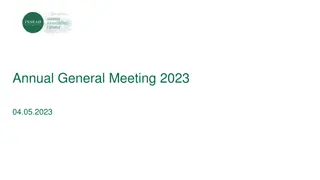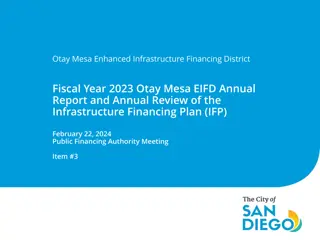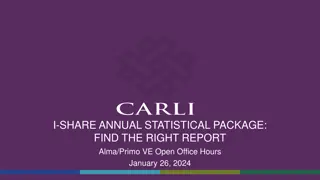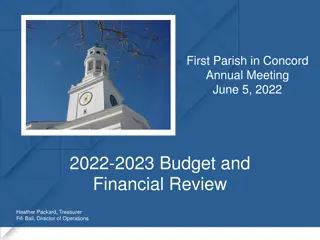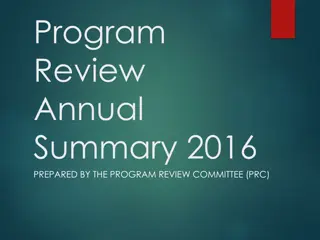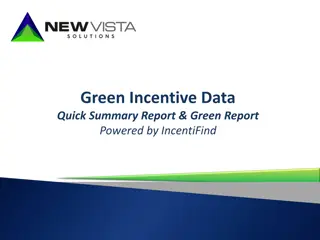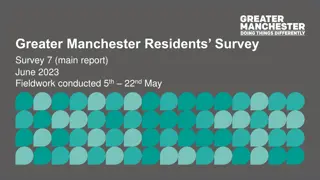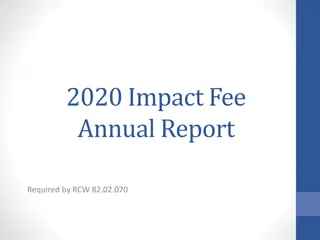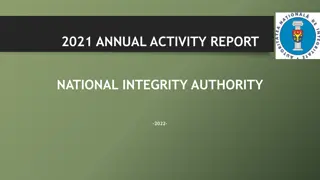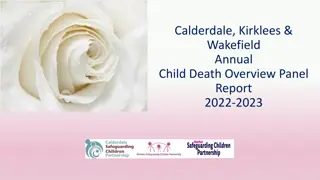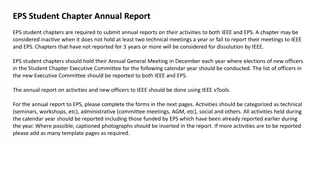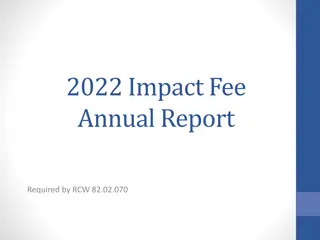NERSA Annual Report Presentation 2023/24 Summary
Overview of NERSA's performance in the 2023/24 financial year, including key achievements, challenges, and insights from the presentation to the Portfolio Committee on Electricity and Energy. The report covers regulatory activities, organizational functions, and financial performance, highlighting successes and areas for improvement.
Download Presentation

Please find below an Image/Link to download the presentation.
The content on the website is provided AS IS for your information and personal use only. It may not be sold, licensed, or shared on other websites without obtaining consent from the author.If you encounter any issues during the download, it is possible that the publisher has removed the file from their server.
You are allowed to download the files provided on this website for personal or commercial use, subject to the condition that they are used lawfully. All files are the property of their respective owners.
The content on the website is provided AS IS for your information and personal use only. It may not be sold, licensed, or shared on other websites without obtaining consent from the author.
E N D
Presentation Transcript
NERSA PRESENTATION OF ITS ANNUAL REPORT FOR 2023/24 AT THE PORTFOLIO COMMITTEE ON ELECTRICITY AND ENERGY (PCEE) PRESENTATION BY NERSA CHAIRPERSON, MR THEMBANI BUKULA, 16 OCTOBER 2024
Presentation Outline A. Executive Summary of detailed presentation 1. Introduction 2. Overview of performance in 2023/24 2.1 Key achievements 2.1.1 Regulatory activities 2.1.2 Organisational activities 2.1.3 Financial performance 2.2 Planned targets not met 2.3 Auditor General of South Africa (AGSA) report 3. Main challenges for the 2023/24 financial year 4. Conclusion 2 B. Detailed presentation on organisational performance (from slide 34 - 90)
A. Executive summary of detailed presentation 3
Introduction 1. To gain a perspective on NERSA s performance in respect of its planned target it should be borne in mind that NERSA s targets relate to a) the regulation of three energy industries, namely electricity, piped gas and petroleum pipelines; including cross-cutting regulatory and organisational functions. b) 2. NERSA s functions are grouped into the following programmes: a) b) c) d) e) Programme 1: Regulatory Service Delivery Programme 2: Regulatory Advocacy and Engagement Programme 3: Innovation Programme 4: Operational Efficiency and Quality Management Programme 5: People and organisational culture 3. The above programmes are linked to Government s Medium-Term Strategic Framework (MTSF) priorities and policies. 5
2. Overview of performance in 2023/24 6
Key achievements Summary 1. NERSA achieved 63/65 (97%) of its annual performance targets for 2023/24. This signifies an overall increase of 8% in the performance when compared to the overall performance of 89% in 2022/23. 2. The above achievement can be broken down as follows: a) Regulation of the electricity industry: 92% achievement, which signifies an increase of 17% in the performance when compared to 2022/23, where 75% of the planned targets were met. b) Regulation of the piped-gas industry: 100% achievement, which signifies the same level of performance when compared to 2022/23, where 100% of the planned targets were met. c) Regulation of the petroleum pipelines industry: 100% achievement, which signifies the same level of performance when compared to 2022/23, where 100% of the planned targets were met. d) Support Functions: 100% achievement, which signifies an 18% increase compared to 2022/23, where 14/17 (82%) of the planned targets were met. e) People and organisational culture environment: 88% achievement, which signifies an increase of 10% in performance when compared to 2022/23, where 78% of the planned targets were met. 8 3. NERSA remains committed to continued improvement in its performance.
2.1.1 Key achievements: Regulatory activities 9
Key achievements Regulatory activities (1) A. Electricity Regulation 1. Approved the following: a) Issuance of 3 licences to the National Transmission Company of South Africa (NTCSA). namely transmission, import export and trading licences. b) 48 Licence applications amended within 120 working days. c) 6 Licence applications for electricity generation facilities, mostly from the preferred bidders of the Renewable Energy Independent Power Producer Procurement (REIPPP) Programme bid window 6 were approved in terms of the Electricity Regulation Act of 2006 (ERA). 2. Achieved the following: a) 62/57 (109%) of distribution compliance audits executed (conducted five more compliance audits than planned). b) 34/35 (97%) of the planned enforcement licence conditions for distribution, transmission and generation were executed in the local municipalities. 3. Approved the following: a) 4 Reports on distribution, transmission, and generation audits. b) 4 Reports on the distribution, transmission and generation of the non-compliance findings. c) 4 Quarterly reports on engagements with customers and stakeholders 10
Key achievements Regulatory activities (2) B. Piped-Gas Regulation 1. Approved the following: a) 12/12 (100%) applications for maximum prices of gas. b) 3 applications on transmission tariffs. c) 5 applications for licences to construct and operate gas facilities and trade in gas. d) 3 applications for amendment of licence applications. e) 11/11 (100%) monitoring reports per licensee on the implementation of Maximum Prices. 2. Approved or noted the following: a) 4 quarterly calculations of the ROMPCO tariff for gas volumes below 120 million Gigajoule were noted. b) 12 monthly reports on volumes of gas transported from Mozambique to SA were noted. c) 3 monitoring reports on compliance with licence conditions were noted. d) 3 monitoring reports on the implementation of transmission tariffs were noted. e) 3 reports on the developments in new gas sources in South Africa and neighbouring countries were noted. 11
Key achievements Regulatory activities (3) C. Petroleum Pipelines Regulation 1. The Energy Regulator approved the following applications: a) 35 storage, loading and pipeline facilities tariff applications and 4 were not approved b) 4 complete licence applications 1 to construct marine loading facility and associated petroleum pipelines 3 to operate a storage facility c) 13 applications for licence amendments / revocations 7 amendments (either extension of construction timelines or additional capacity) 6 revocations (mainly due to change of ownership) 2. The following reports were noted by the PPS and Energy Regulator: a) 2 reports on trends regarding utilisation of storage facilities and third-party access b) 2 reports on the inland security of supply c) 2 reports on the construction of new facilities d) 2 reports on licensees compliance with statutory reporting requirements e) 1 Report on investigations done into suspected unlicensed activities f) 1 Complaints lodged against NERSA licensees 12
2.1.2 Key achievements: Organisational activities 13
Key achievements Organisational activities (1) A. Human Resource Management (1) 1. Achieved a vacancy rate of 5.9% compared to a 5.5% vacancy rate in the same period for 2022/23. 2. Staff strength = 236 employees a) 16 (5.9%) vacancies by the end of the review period. 3. Finalised the Operating Model Review project a) Aimed to optimize business processes, resource allocation, and the organisational structure in order to enhance efficiency, effectiveness and alignment with strategic goals. b) The next phase of the project will be the implementation of the recommendations of the Operating Model Review. 4. Conducted an organisational culture assessment. a) Provided management with valuable insights into the current state of the organisational culture, enabling them to make informed decisions and take actions that foster a positive and productive work environment. 14
Key achievements Organisational activities (2) A. Human Resource Management (2) 5. NERSA talent management initiatives continued the implementation of the technical regulatory training programme: a) Aimed at deploying a learning and development strategy geared at building and cultivating a high-performance and highly engaged workforce. b) Aimed to ensure the capacitation and upskilling of roles in the Regulatory Divisions, which is expected to result in excellence, professionalism and innovation within NERSA. B. International Coordination and Partnerships a) Continued to be an active member of the Regional Electricity Regulators Association (RERA) and the African Forum for Utility Regulators (AFUR). NERSA presented a paper on market reforms at the AFUR Conference of 2023. b) 15
2.1.3 Key achievements: Financial performance 16
Key achievements Financial performance (1) 1. Revenue was under-recovered by R4,4 million due to lower-than-expected volumes in electricity and petroleum pipelines. 2. Employment costs were below budget due to vacancies. 3. Operating expenditure was below budget due to fewer travel engagements than expected. 4. Net deficit/ utilisation of reserves were lower than expected due to expenditure coming in below budget. 17
Key achievements Financial performance (2) 1. The financial position as at 31 March 2024, was a positive net asset value of R207 million. 2. This was mainly due to cash reserves of R122 million included in current assets invested in the SA Reserve Bank s Corporation for Public Deposits account. 3. The current ratio was at 2.4 where there are sufficient assets to cover current liabilities. 18
Key achievements Financial performance (3) Revenue collection challenges 1. Actual volumes reported were lower than expected which affected revenue collection in 2023/24. Electricity generation volumes were 4.3% below budget due to load shedding implemented in 2023 calendar year. Piped gas volumes were above budget by 11.3% due to increase in demand on gas imports Petroleum pipeline volumes were significantly lower than expected by 7% due to maintenance shut down on one of the refinery plants which affected export volumes 2. 3. 4. Actual 2023/24 Volumes 200,789,043 186,770,017 15,159,132,565 Budget 2023/24 Volumes 209,903,300 167,832,961 16,297,000,000 Variance Industry Electricity [MegaWatt Hours] Piped-Gas [Gigajules] Petroleum Pipelines [Litres] Volumes (9,114,257) 18,937,056 (1,137,867,435) % 1. . -4.3% 11.3% -7.0% 19
Key achievements Financial performance (4) Revenue collection challenges 1. 2. 3. Decline in volumes remains a challenge in the budget in forecast years. Electricity generation volumes are projected to decline further in 2026/27 Piped gas volumes are projected to decline significantly from 2026/27 due to possible depletion of gas reserves Petroleum pipeline volumes are remaining stagnant due to less product imports through pipelines and possibly closure of refineries 4. Actual 2019/20 Actual 2020/21 Actual 2021/22 4.3% 175 1.5% Actual 2022/23 -3.0% -1.9% 15.5 Actual 2023/24 -4.0% 8.5% 15.2 -2.2% Budget 2024/25 Forecast 2025/26 Forecast 2026/27 -3.8% -23.9% 15.9 0.6% Forecast 2027/28 Industry Volumes Electricity (TWh) 215 207 215 209 201 200 -0.3% 182 -2.6% 15.6 3.2% 206 3.1% 180 -1.1% 15.8 1.1% 199 183 -7.9% 126 -8.0% 16.1 1.3% % Change -3.9% 173 -3.0% 13.0 -26.8% Piped Gas (Gj/million) 178 172 187 137 % Change Petroleum Pipeline (ltrs/billion) 17.8 14.3 10.1% % Change 8.3% 20
Planned targets not met Targets not met Reason for not meeting targets The outcome of the industry Stakeholder consultations was that there is still a need for further consultations to deal with legal implications of the proposed amendments and other technical issues that have emerged in the process. Therefore, the GCAC is not in a position to recommend the amendments to NERSA for approval There were two terminations (due to retirement resignation) of employees with disabilities during the third quarter: One due to retirement and one due to medical Proposed solution Of the 80% - targeted tools and systems for electricity industry reviewed and developed planned only 70% was achieved The project plan to be revised to cater for more stakeholder consultation meetings consistently communicate with the Grid Code secretariat for timely arrangements of these meetings a changing and 2% of people with disabilities employed was planned and only 1% was achieved The recruitment process will place specific focus on the recruitment of people with disabilities in 2024/25 and 22
2.3 Auditor General of South Africa (AGSA) report 23
2023/24 Auditor General of South Africa Report (1) Annual Financial Statements 1. Audit Outcome Annual Financial Statements Unqualified opinion with no findings (Clean Audit) 2. Irregular Fruitless and Wasteful Expenditure None reported for 2023/24 3. NERSA has had unqualified audits for the last 5 years 24
2023/24 Auditor General of South Africa Report (2) 4. Audit Outcome Performance information Unqualified opinion with material findings. The 12 material findings made by the AG were all under Sub-Programme 1: Electricity Industry Regulator (EIR). These can be categorised into the following areas: - Missing targets or key performance indicators (KPIs) related to one of the core functions, that is enforcement performance and compliance and taking appropriate steps in case of non-performance . The Electricity Division is developing relevant indicators to address the findings. These will be effected in the 2024/25 APP and future plans. - Reliability and consistency owing to insufficient evidence provided to support achievement. The licensing, customer education and dispute resolution portal is being developed through NERSA s ICT as part of the automation of NERSA systems. - Consistency and measurability of 3 key performance indicators. The finding has been addressed by reviewing and updating the affected KPIs and their TIDs in the 2024/25 APP. - Output indicators not accurately reported and adjusted in the annual performance report. This APR was updated before the audit process concluded. 25
3. Main challenges for the 2023/24 financial year 26
Main challenges for the 2023/24 (1) Electricity Industry Regulation Main challenges Mitigation actions 1. Delay in the development of regulatory tools (standard processes, rules, frameworks, pricing methodologies, etc.) Improve planning and upskilling of some resources in line with the changes in the industry. 2. Unimplementability of some of the provisions of the Electricity Regulation Act of 2006 Promulgation of the Electricity Regulation Amendment Act of 2024 3. Inability submitting their cost of supply (CoS) together with their tariff applications for the 2023/24 financial year of electricity distributors from NERSA is intensifying training and workshops to assist municipalities develop their cost of supply (CoS) studies this includes assistance by Sustainability Energy Africa a private service provider. 27
Main challenges for the 2023/24 (2) Piped-Gas Industry Regulation Main challenges Mitigation actions 1. Lack of adequate gas supply Current gas supplies are not sufficient to meet demand from industry Hampers growth and competition in the gas market Furthermore, there is possible decline of natural gas supply from Mozambique effective from 2025 Explore supply opportunities from neighboring countries such as Mozambique/Namibia/Tanzania Importation of LNG to plug supply deficit Gas Masterplan to enable local gas sources as a long-term supply solution 2. Limited mandate under the current Gas Act e.g. distribution tariffs not regulated, no provisions for third party access to gas distribution facilities Expedite finalization of the Gas Amendment Bill to give NERSA sufficient regulatory powers 28
Main challenges for the 2023/24 (3) Piped-Gas Industry Regulation Main challenges Mitigation actions 3. Inadequate competition in the gas market Market is dominated by one vertically integrated supplier (Sasol Gas) Sasol Gas owns and operates more than 90% of gas infrastructure NERSA conducted a study to identify measures to facilitate competition, investment and achieve security of supply in the piped- gas industry. A plan was also developed to implement the measures identified to promote competition and investments in the industry Enforce third party access to facilitate entry of new players in the market 29
Main challenges for the 2023/24 (4) Petroleum Pipelines Industry Regulation Main challenges Mitigation actions 1. Outdated legislation (Petroleum Pipelines Act) for an example enforcement of compliance for below bulk licensees. Continuous engagements with the Policy Maker on the amending of the legislation. 2. Overlapping mandates in terms of petroleum infrastructure regulation continue to pose challenges in terms of licensing and alignment of activities. Through operationalisation Understanding National Ports Authority (TPNA), Port Regulator of South Africa (PRSA) authorities have commenced the collaboration, cooperation, and sharing of information to better enable a seamless regulatory. the implementation the Memorandum between NERSA, and of of Transnet 30
Main challenges for the 2023/24 (5) Organisational Main challenges Mitigation actions 1. Inability to recruit people living with disabilities. Partnering associations as well as head hunting with disability organisations/ 2. Decline in volumes remains a challenge in the budget in forecast years. Implementation of the developed Financial Sustainability Strategy and Plan 31
Conclusion 1. NERSA is thankful for the opportunity given to present its annual report from 2023/24 financial year. 2. The results of NERSA s work continues to have a profound impact on the lives of ordinary people as well as on the economy of the country. 3. The regulation of the three energy industries continues to pose some challenges in that the Energy Regulator is required to balance the conflicting interests of licensees, investors, consumers/end-users and the policy maker. 4. There is an urgent need for finalization of the Gas Amendment Bill and the review of the Petroleum Pipelines Act. 5. To deal with regulatory challenges, NERSA has undertaken various initiatives to refine regulatory practices and methodologies in its quest to become a recognized world-class leader in energy regulation and will continue to do so. 33
Thank you Website: www.nersa.org.za Tel: 012 401 4600 Fax: 012 401 4700 Email: info@nersa.org.za @NERSAZA @NERSA_ZA 34
B. Detailed presentation on organisational performance 35
Presentation Outline 1. 2. 3. 4. 5. 6. 7. 8. 9. 10. Main challenges for the 2023/24 financial year and corrective steps being taken 11. Conclusion Introduction Mandate Strategic Imperatives Corporate Governance Performance in the 2023/24 financial year Human Resource Management International Activities Financial performance Auditor General of South Africa (AGSA) report 36
Introduction (1) The National Energy Regulator of South Africa (NERSA), a Schedule 3A Public Finance Management Act, 1999 (Act No. 1 of 1999) Public Entity was established on 1 October 2005 in terms of the National Energy Regulator Act, 2004 (Act No. 40 of 2004) to regulate: Electricity industry (Electricity Regulation Act, 2006 (Act No. 4 of 2006)); Piped-Gas industry (Gas Act, 2001 (Act No. 48 of 2001)); and Petroleum Pipelines industry (Petroleum Pipelines Act, 2003 (Act No. 60 of 2003)). 38
Introduction (2) Governance Structure In terms of section 5 of the Energy Regulator Act, No. 40 of 2004, the Minister appoints nine (9) Regulator Members: Of the nine (9) Regulator Members: Four (4) are Full-Time Regulator Members (FTRMs) and hold office for a period of five (5) years Five (5) are Part-Time Regulator Members (PTRMs) and hold office for a period of four (4) years - - - Chairperson & Deputy Chairperson are Part-Time Members Full-Time Regulator Members are: Chief Executive Officer 3 Members each primarily responsible for Electricity, Piped-Gas and Petroleum Pipelines industry regulation - - 39
Introduction (3) Regulatory Independence In terms of the National Energy Regulator Act the Regulator must act independently when making regulatory decisions. In order to ensure regulatory independence, the Energy Regulator has developed regulatory mechanisms (i.e. procedures, rules, guidelines, systems, etc.) that makes its decision-making processes to be open, transparent, credible, consistent, predictable, as well as making it accountable for its decisions. Revenue and Funding NERSA is currently funded through imposing prescribed levies, licence fees and registration fees on the regulated industries following a prescribed transparent procedure. 40
Introduction (4) NERSA s overarching roleis to: Ensure the development and sustainability of the electricity, piped- gas and petroleum pipelines industries; - while facilitating the affordability of and accessibility to the three regulated industries to balance the economic interests of all stakeholders - to ensure the sustainable socio-economic development of South Africa and a better life for all. 41
Vision To be a recognized world-class leader in energy regulation Mission To regulate the energy industry in accordance with government laws and policies, standards and international best practices in support of sustainable and orderly development 42
2.Mandate 43
Mandate (1) NERSA s mandate is anchored in: 4 Primary Acts: National Energy Regulator Act, 2004 (Act No. 40 of 2004) Electricity Regulation Act, 2006 (Act No. 4 of 2006) Gas Act, 2001 (Act No. 48 of 2001) - Petroleum Pipelines Act, 2003 (Act No. 60 of 2003) - - - 3 Levies Acts: Gas Regulator Levies Act, 2002 (Act No. 75 of 2002) Petroleum Pipelines Levies Act, 2004 (Act No. 28 of 2004) Section 5B of the Electricity Act, 1987 (Act No. 41 of 1987) - - - 3 Facilitating Acts: Public Finance Management Act, 1999 (Act No. 1 of 1999) (PFMA) Promotion of Access to Information Act, 2000 (Act No. 2 of 2000) (PAIA) Promotion of Administrative Justice Act, 2000 (Act No. 3 of 2000) (PAJA) Protection of Personal Information Act, 2013 (Act No. 4 of 2013) (POPIA) - - - - 44
Mandate (2) 1. NERSA s mandate is summarised as follows: a) Issuing of licences and setting pertinent conditions b) Setting and/or approving tariffs and prices c) Monitoring and enforcing compliance with licence conditions d) Dispute resolution including mediation, arbitration and the handling of complaints e) Gathering, storing and disseminating industry information f) Setting of rules, guidelines and codes for the regulation of the three industries g) Determination of conditions of supply and applicable standards h) Registration of import and production activities 2. In executing its mandate NERSA endeavours to balance the conflicting interest of both licensed entities and end users. 45
Impact Statements A stable and accessible Electricity Industry that supports an improved quality of life and economic activity Electricity Industry Regulation Efficient, competitive and transformed piped-gas industry safe, effective, sustainable, accessible, Piped-Gas Industry Regulation Efficient, safe, effective, sustainable, competitive and transformed petroleum pipelines industry Petroleum Pipelines Industry Regulation NERSA established and perceived as an efficient, effective and credible regulator Support services 47
Corporate Governance (1) 1. NERSA is committed to good corporate governance. It adopted the Corporate Governance Handbook containing corporate governance rules and prescripts. 2. The provisions of the National Energy Regulator Act, 2004 (Act No. 40 of 2004), the PFMA, and the principles contained in the King IV Report on Corporate Governance are included in the Corporate Governance Handbook to which NERSA adheres. 3. NERSA ensures declaration of interest. 4. In adhering to best practices and sound governance principles, the Energy Regulator subjects itself to an annual assessment on the effectiveness of the Energy Regulator and its committees. 49
Corporate Governance (2) Oversight The Parliamentary Portfolio Committee (PPC) on Electricity and Energy has oversight of NERSA Executive Authority The Executive Authority of the National Energy Regulator is the Minister of Electricity and Energy. The Energy Regulator submitted a number of statutory documents to the Executive Authority (DMRE), namely: a) The Annual Performance Plan (2023/24 2025/26) submitted by 31 January 2023 to the Minister of Mineral Resources and Energy and approval and tabling in Parliament. 4 quarterly performance reports submitted within prescribed timeframes The Annual Report (2023/24) was submitted to the Minister of Mineral Resources and Energy, the Minister of Finance, and the Auditor-General by August 2024. b) c) Accounting Authority The Energy Regulator, as the Accounting Authority, retains full and effective control over NERSA. 50
